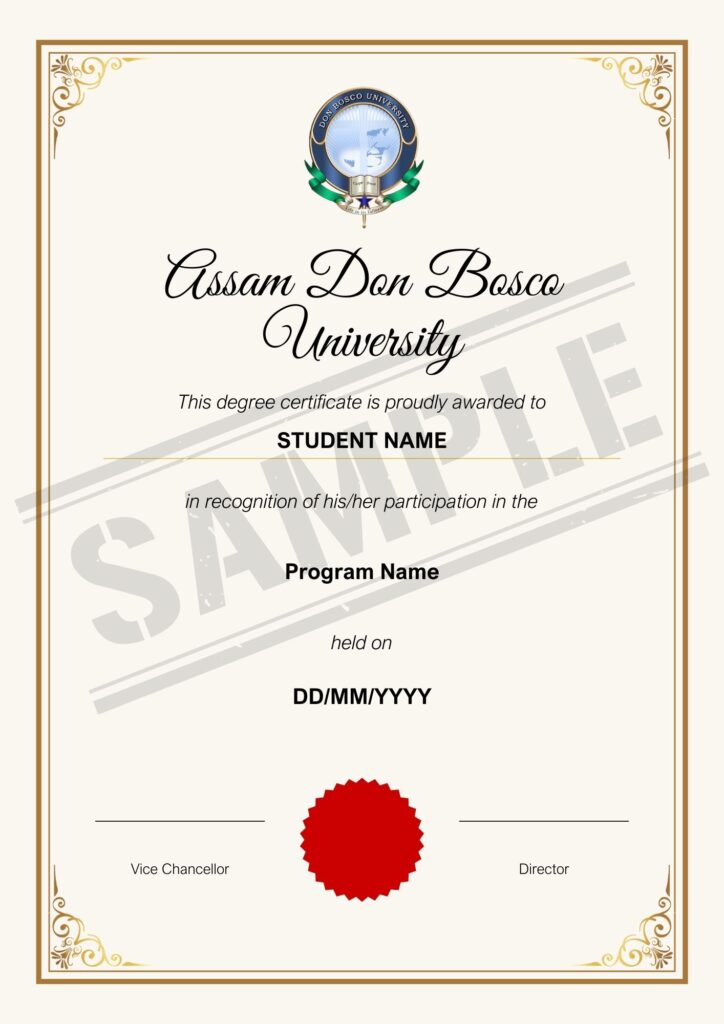Test Program
Integrated BA BEd
Duration: 04 Years
No. Of Seats: 50
Fee Structure
Instalments | Admission Fees | Caution Deposit | Annual Fees | Tuition Fees | Total |
July 2025 | 18,000 | 10,000 |
| 40,000 | 68,000 |
January 2026 |
|
| 17,000 | 40,000 | 57,000 |
July 2026 |
|
| 17,000 | 40,000 | 57,000 |
January 2027 |
|
|
| 40,000 | 40,000 |
July 2027 |
|
| 17,000 | 40,000 | 57,000 |
January 2028 |
|
|
| 40,000 | 40, 000 |
July 2028 |
|
| 17,000 | 40,000 | 57,000 |
January 2029 |
|
|
| 40,000 | 40, 000 |
M.Tech in Construction Engineering & Management
The M.Tech in Construction Engineering & Management at Assam Don Bosco University is a specialized program designed to equip students with the skills and knowledge required to lead large-scale construction projects. The curriculum integrates advanced construction techniques with project management practices, emphasizing innovation, sustainability, and efficiency. Students gain hands-on experience through industry collaborations and practical training, preparing them to address complex challenges in construction. The program focuses on both technical expertise and management capabilities, ensuring graduates are well-versed in modern construction practices and leadership roles. With a strong foundation in engineering and management, students are prepared to drive excellence in the construction industry. The program fosters critical thinking, problem-solving, and effective decision-making for future construction leaders.

Program Highlights and Advantages
Innovative Learning for Future Construction Leaders

Industry Collaboration
Real-world experience through partnerships with construction firms.

Comprehensive Curriculum
Focus on both engineering and project management.

Advanced Technology
Exposure to cutting-edge tools and construction software.

Sustainability Focus
Emphasis on sustainable construction practices.
Program Overview & Structure
Course Type | Curricular component/course name | Category | Credits | Total Credits |
Students Induction programme | EC | 2 weeks | ||
Foundation of Education | Evolution of Indian Education | EC | 4 | 20 |
Disciplinary/Inter-disciplinary courses (Major) | Economics/English/Psychology | DSC | 4 | |
Disciplinary/Inter-disciplinary courses (Minor) | Economics/English/Psychology | IDSC | 4 | |
Ability Enhancement & Value-Added Courses | Communicative English | AEC | 4 | |
Art Education (performing and Visual) | VAC | 2 | ||
Understanding India (Indian Ethos and Knowledge Systems) | VAC | 2 |
Course Type | Curricular component/course name | Category | Credits | Total |
Disciplinary/Inter-disciplinary courses (Major) | Economics/English/Psychology | DSC | 4 | 20 |
Disciplinary/Inter-disciplinary courses (Major) | Economics/English/Psychology | DSC | 4 | |
Disciplinary/Inter-disciplinary courses (Minor) | Economics/English/Psychology | IDSC | 4 | |
Ability Enhancement & Value-Added Courses | Communicative Hindi | AEC | 4 | |
Understanding India (Indian Ethos and Knowledge Systems) | VAC | 2 | ||
Teacher and Society | VAC | 2 |
Course Type | Curricular component/course name | Category | Credits | Total |
Foundation of Education | Child Development & Educational Psychology | EC | 4 | 20 |
Disciplinary/Inter-disciplinary courses (Major) | Economics/English/Psychology | DSC | 4 | |
Disciplinary/Inter-disciplinary courses (Major) | Economics/English/Psychology | DSC | 4 | |
Disciplinary/Inter-disciplinary courses (Minor) | Economics/English/Psychology | IDSC | 4 | |
General Pedagogy Courses | Basics of Pedagogy at Secondary Stage | EC | 4 |
Course Type | Curricular component/course name | Category | Credits | Total |
Foundation of Education | Philosophical & Sociological Perspectives of Education-I | EC | 4 | 20 |
Disciplinary/Inter-disciplinary courses (Major) | Economics/English/Psychology | DSC | 4 | |
Disciplinary/Inter-disciplinary courses (Major) | Economics/English/Psychology | DSC | 4 | |
Disciplinary/Inter-disciplinary courses (Minor) | Economics/English/Psychology | IDSC | 4 | |
State -Specific Content cum-Pedagogy Courses (any two) | Content Cum Pedagogy of Social Sciences -I: Course 1 | EC | 2 | |
Content Cum Pedagogy of Social Sciences -I: Course 2 | EC | 2 | ||
Content Cum Pedagogy of Social Sciences -I: Course 3 | EC | 2 |
Course Type | Curricular component/course name | Category | Credits | Total |
Disciplinary/Inter-disciplinary courses (Major) | Economics/English/Psychology | DSC | 4 | 20 |
Disciplinary/Inter-disciplinary courses (Major) | Economics/English/Psychology | DSC | 4 | |
Disciplinary/Inter-disciplinary courses (Major) | Economics/English/Psychology | DSC | 4 | |
State -Specific Content cum-Pedagogy Courses (any two) | Content Cum Pedagogy of Social Sciences -II: Course 1 | EC | 2 | |
Content Cum Pedagogy of Social Sciences -II: Course 2 | EC | 2 | ||
Content Cum Pedagogy of Social Sciences -II: Course 3 | EC | 2 | ||
Ability Enhancement & Value-Added Courses | ICT in Education | VAC | 2 | |
School Experience | Pre-internship Practice (Demonstration lessons, Peer teaching) | EC | 2 |
Course Type | Curricular component/course name | Category | Credits | Total |
Foundation of Education | Assessment & Evaluation | EC | 2 | 20 |
Inclusive Education | EC | 2 | ||
Disciplinary/Inter-disciplinary courses (Major) | Economics/English/Psychology | DSC | 4 | |
Disciplinary/Inter-disciplinary courses (Major) | Economics/English/Psychology | DSC | 4 | |
State -Specific Content cum-Pedagogy Courses (any two) | Content Cum Pedagogy of Social Sciences -III: Course 1 | EC | 2 | |
Content Cum Pedagogy of Social Sciences -III: Course 2 | EC | 2 | ||
Content Cum Pedagogy of Social Sciences -III: Course 3 | EC | 2 | ||
Ability Enhancement & Value-Added Courses | Mathematical & Quantitative Reasoning | VAC | 2 | |
School Experience | School Observation (Field Practice) | EC | 2 |
Course Type | Curricular component/course name | Category | Credits | Total |
Foundation of Education | Perspectives on School Leadership and Management | EC | 2 | 20 |
Curriculum Planning & Development (textbooks, material development, etc) | EC | 2 | ||
Ability Enhancement & Value-Added Courses | Art Education (performing and Visual) | VAC | 2 | |
Sports, Nutrition and Fitness) | VAC | 2 | ||
School Experience | School-based Research Project | EC | 2 | |
Internship in Teaching | EC | 10 |
Course Type | Curricular component/course name | Category | Credits | Total |
Foundation of Education | Philosophical & Sociological Perspectives of Education-II | EC | 4 | 20 |
Education Policy Analysis | EC | 2 | ||
One Elective from the offered courses: | 4 | |||
Adolescence Education | EC | |||
Education for Mental health | ||||
Education for Sustainable Development | ||||
Emerging Technologies in Education | ||||
Gender Education | ||||
Guidance and Counselling | ||||
Human Rights Education | ||||
Peace Education | ||||
Sports and Fitness Education | ||||
Tribal Education | ||||
Economics of Education | ||||
Ability Enhancement & Value-Added Courses | Yoga and Understanding Self | VAC | 2 | |
Citizenship Education, Sustainability and Environment Education | VAC | 2 | ||
School Experience | Post Internship (Review and Analysis) | EC | 2 | |
Creating Teaching Leaning Material/ Work Experience | EC | 10 | ||
Community Engagement and Service | Community Engagement and Service (NSS related activities, New India Literacy Programme, etc) | CE | ||
Commutative Credits | 160 | |||
Degree offered by us
EC: Education Course
DSC: Discipline Specific Course
IDSC: Interdisciplinary Specific Course
AEC: Ability Enhancement Course
VAC: Value Added Course
CE: Community Engagement and Service

Eligibility
Eligibility Criteria
Passed Higher Secondary School Leaving Examination or equivalent with 50% of the aggregate.
Career Impact
Empowering Careers in Construction and Project Management
Project Management
Lead large-scale construction projects with expertise.
Construction Consulting
Provide solutions for construction challenges in various sectors.
Industry Leadership
Manage and lead teams in construction firms.
Research and Development
Innovate in construction technologies and methodologies.
F.A.Q.
The university offers a range of undergraduate, graduate, and doctoral programs across disciplines including engineering, science, arts, business, and health sciences. Each program has its own specific requirements and areas of focus.
You can apply online through our university’s admissions portal. Complete the application form, submit the required documents (such as transcripts, test scores, and recommendation letters), and pay the application fee. Detailed instructions are available on our admissions webpage.
Admission requirements vary by program. Typically, undergraduate programs require a high school diploma and specific academic credentials, while graduate programs may require a bachelor’s degree in a related field, relevant test scores, and work experience. Be sure to review the specific requirements for the program to which you are applying.
Yes, the university offers a variety of scholarships and financial aid programs based on academic merit, financial need, and other criteria. Information about available scholarships and how to apply is available on the university’s financial aid webpage.
Application deadlines vary depending on the program and the intake period (e.g., fall, spring). Be sure to check the program’s admissions page for specific deadlines.
